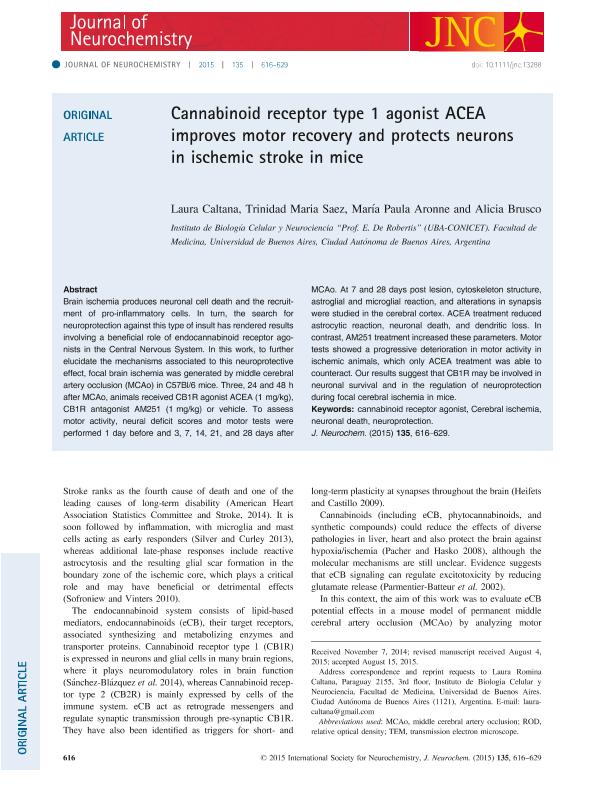Artículo
Cannabinoid receptor type 1 agonist ACEA improves motor recovery and protects neurons in ischemic stroke in mice
Caltana, Laura Romina ; Saez, Trinidad María de Los Milagros
; Saez, Trinidad María de Los Milagros ; Aronne, María Paula
; Aronne, María Paula ; Brusco, Herminia Alicia
; Brusco, Herminia Alicia
 ; Saez, Trinidad María de Los Milagros
; Saez, Trinidad María de Los Milagros ; Aronne, María Paula
; Aronne, María Paula ; Brusco, Herminia Alicia
; Brusco, Herminia Alicia
Fecha de publicación:
11/2015
Editorial:
Wiley
Revista:
Journal of Neurochemistry
ISSN:
0022-3042
e-ISSN:
1471-4159
Idioma:
Inglés
Tipo de recurso:
Artículo publicado
Clasificación temática:
Resumen
Brain ischemia produces neuronal cell death and the recruitment of pro-inflammatory cells. In turn, the search for neuroprotection against this type of insult has rendered results involving a beneficial role of endocannabinoid receptor agonists in the Central Nervous System. In this work, to further elucidate the mechanisms associated to this neuroprotective effect, focal brain ischemia was generated by middle cerebral artery occlusion (MCAo) in C57Bl/6 mice. Three, 24 and 48 h after MCAo, animals received CB1R agonist ACEA (1 mg/kg), CB1R antagonist AM251 (1 mg/kg) or vehicle. To assess motor activity, neural deficit scores and motor tests were performed 1 day before and 3, 7, 14, 21, and 28 days after MCAo. At 7 and 28 days post lesion, cytoskeleton structure, astroglial and microglial reaction, and alterations in synapsis were studied in the cerebral cortex. ACEA treatment reduced astrocytic reaction, neuronal death, and dendritic loss. In contrast, AM251 treatment increased these parameters. Motor tests showed a progressive deterioration in motor activity in ischemic animals, which only ACEA treatment was able to counteract. Our results suggest that CB1R may be involved in neuronal survival and in the regulation of neuroprotection during focal cerebral ischemia in mice.
Archivos asociados
Licencia
Identificadores
Colecciones
Articulos(IBCN)
Articulos de INST.DE BIOLO.CEL.Y NEURCS."PROF.E.DE ROBERTIS"
Articulos de INST.DE BIOLO.CEL.Y NEURCS."PROF.E.DE ROBERTIS"
Citación
Caltana, Laura Romina; Saez, Trinidad María de Los Milagros; Aronne, María Paula; Brusco, Herminia Alicia; Cannabinoid receptor type 1 agonist ACEA improves motor recovery and protects neurons in ischemic stroke in mice; Wiley; Journal of Neurochemistry; 135; 3; 11-2015; 616-629
Compartir
Altmétricas



